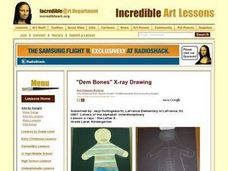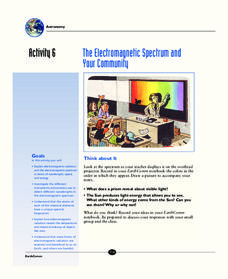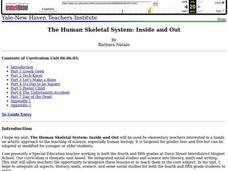Curated OER
X-Ray Eyes
Learners observe Australian X-ray paintings for information and to understand the art techniques used. Then they imagine and draw the inner organs of an animal. Students also research the anatomy of the animal to analyze the accuracy of...
Curated OER
X-ray Spectroscopy and the Chemistry of Supernova Remnants
This link takes you to a comprehensive unit that delves into emission spectra and supernovas. There are four parts: How and where elements are created, electromagnetic radiation, spectroscopy, and the newest technology for studying our...
Curated OER
History of the X-Ray
Seventh graders discuss the history of the x-ray machine. In this social science instructional activity, 7th graders understand how a x-ray machine works. Students recognize that there have been many improvements to the x-ray machine...
Curated OER
x-rays - the Letter X
Students demonstrate the ability to draw vertical, horizontal, and diagonal lines, recognize the difference between inside and outside, and create a picture of themselves.
Curated OER
How Big Is That Star?
Aspiring astronomers study stars. They compare stars and explain the relationship between radius, mass, and diameter. By creating a star simulation, they discover how a binary star system's orbit can cause changes in the observed...
Teach Engineering
Exploring Bone Mineral Density
Bone up on bone density. The second installment of the seven-part series has pupils read articles on two different websites to learn about bone density and its measurement, as well as X-rays and other imaging tools. A quiz assesses their...
Teach Engineering
Light Intensity Lab
Let there be light. The last installment of a seven-part series has pupils conduct an experiment on light attenuation through different numbers of transparency sheets. They then relate the results back to how X-rays measure bone density.
Curated OER
What Wavelength Was That?
A combination of informative text, photos, and graphics comprise this sharp show on electromagnetic radiation. Some slides mention hands-on activities for demonstrating concepts, so if you want to include them you will need to figure out...
It's About Time
The Electromagnetic Spectrum and Your Community
Do you have blossoming astronomers who seek to understand the electromagnetic spectrum? Assist them with exploring electromagnetic radiation and the electromagnetic spectrum as the class conducts various activities to demonstrate...
Columbus City Schools
Earthly Waves
How did scientists discover what lies beneath the earth's surface? Dig a hole? X-ray vision? Guide your class through the types of seismic waves and how these waves helped shed light on Earth's many layers. The included resources provide...
Cold Spring Harbor Laboratory
The DNA Molecule Is Shaped like a Twisted Ladder
One of the first models of DNA appeared to be a triple helix. Young scientists learn about the many scientists who worked to find the shape of DNA. They observe multiple models, tests, and experiments to understand the conclusions. An...
Curated OER
Make Your Own "Weather" Map
High schoolers create their own "weather" map using data from x-ray sources. They analyze and discuss why it is important to organize data in a fashion in which is easy to read. They compare and contrast different x-ray sources using a...
Cornell University
Diffraction Demystified
Study diffraction patterns using CDs and DVDs! Scholars measure the diffraction patterns of a light wave as it hits a CD or DVD. Using the information, they can measure the distance between the tracks.
National Nanotechnology Infrastructure Network
Lines on Paper - Laser Box
See what you cannot see by getting a little creative. An intriguing lesson has learners use lasers to explore X-ray diffraction. Given a box with unknown structures, they shine a laser through the box and interpret the results....
Curated OER
Atoms, Molecules and Ions
Atomic theory, experiments that contributed to our knowledge of matter, atomic structure, isotopes, and ions are covered in these 33 slides. Quality diagrams and labeled charts will help activate understanding. The presentation concludes...
Curated OER
The Human Skeletal System: Inside and Out
Students investigate the body. In this biology lesson plan, students will learn the basics of the bones in their body and about how they can be injured. Students will participate in a total of seven activities designed to improve their...
Curated OER
Norval Morrisseau
Students investigate the art of Norval Morrisseau and create "x-ray paintings" using styles and symbols related to his work in this one or two day art lesson for third grade through twelfth grade. Emphasis is placed upon creative...
Polar Trec
Staying Warm in Antarctica!
Has your class ever wondered how animals and scientists stay warm in the Polar Regions? Kids will investigate to understand the three types of heat transfer and how heat transfer affects those trying to stay toasty in sub-zero...
Curated OER
Human Body Series - Bones, Muscles, and Joints
Strengthen understanding of the musculoskeletal system with a structured lesson! Begin with a discussion of bones, joints, and muscles. Have small groups read assigned articles and watch videos to gather information and then write a...
Curated OER
Understanding Angles
In this geometry worksheet, students identify the different measure of each angle. They rotate the rays around and make observations about the angles formed. There are 15 questions and lots of examples.
Curated OER
Catching Some Rays
Sixth graders explore the tilt of Earth's axis. In this Earth lesson, 6th graders read a Greek mythology story explaining why there are seasons. Students build a sun-ray gathering tool from styrofoam, glue, thermometers, skewers, and...
Curated OER
Tennis Balls in a Can
Make your classroom interesting by teaching or assessing through tasks. Deepen the understanding of Geometry and motivate young mathematicians. The task uses investigation with tennis balls and their container to prompt learners to use...
Curated OER
Madame Marie Curie & The Science of Radioactivity
A student-created, yet comprehensive 37-slide presentation on the life and contributions of Marie Curie awaits your upcoming chemists! With plenty of photographs, this resource introduces the woman who is responsible for our early...
Santa Monica College
Flame Tests of Metal Cations
Scientists used flame tests to identify elements long before the invention of emission spectroscopy. Young chemists observe a flame test of five metal cations in the fourth instructional activity of an 11-part series. Individuals then...

























